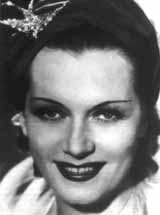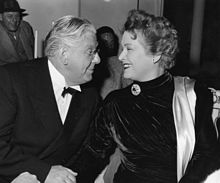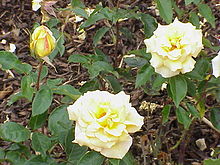Olga Chekhova

 Clash Royale CLAN TAG#URR8PPP
Clash Royale CLAN TAG#URR8PPP | Olga Checkhova | |
|---|---|
 | |
| Born | Olga Knipper (1897-04-14)14 April 1897 Aleksandropol, Erivan Governorate, Russian Empire (now Gyumri, Armenia) |
| Died | 9 March 1980(1980-03-09) (aged 82) Munich, West Germany |
| Nationality | Russian |
| Occupation | Actress |
| Years active | 1926–1974 |
Olga Konstantinovna Chekhova, born Knipper (Russian: Ольга Константиновна Чехова (14 April 1897, Aleksandropol, Erivan Governorate, Russian Empire (now Gyumri, Armenia) – 9 March 1980, Munich, West Germany) was a Russian-German actress. Her film roles include the female lead in Alfred Hitchcock's Mary (1931).
Contents
1 Biography
2 Joseph Goebbels
3 Later years
4 Selected filmography
5 References and notes
6 External links
Biography
Born Olga Knipper, she was the daughter of Konstantin Knipper, a railway engineer, and the niece and namesake of Olga Knipper (Anton Chekhov's wife), both Lutherans of ethnic German ancestry. She went to school in Tsarskoye Selo but, after watching Eleonora Duse, joined the Moscow Art Theatre's studio. There she met the Russian-Jewish actor Mikhail Chekhov (Anton's nephew) in 1914 and married him the same year, taking his surname as her own. Their daughter, also named Olga, was born in 1916.[1]
During the year of the 1917 October Revolution, Chekhova divorced her husband but kept his name. In the first year of the revolution, she joined a cabaret-theatre group called Sorokonozhka (The Little Centipede), as the troup consisted of twenty members and only forty feet. Chekhova also was given a part in a silent movie, Anya Kraeva. The following year, in 1918, she was given roles in Cagliostro and in The Last Adventure of Arsène Lupin.[2] Although she was a part of the social circle around the Moscow Art Theatre, she never played a role there, despite her later claims to having her first theatre role in The Cherry Orchard.
She managed to get a travel passport from the Soviet government, possibly in exchange for her cooperation, which led to permission to leave Russia. She was accompanied by a Soviet agent on a train to Vienna, then she moved to Berlin in 1920. Her first cinema role in Germany was in Friedrich Wilhelm Murnau silent movie Schloß Vogelöd (1921).[3] She played in Max Reinhardt's productions at UFA. She made the successful transition from silent film to talkies. In the 1930s, she rose to become one of the brightest stars of the Third Reich and was admired by Adolf Hitler. She appeared in such films as Der Choral von Leuthen although she preferred comedies.[4]
Joseph Goebbels
A published photograph of her sitting beside Hitler at a reception gave the leaders of the Soviet intelligence service the impression that she had close contacts with Hitler. She had more contact with the Minister of Propaganda, Joseph Goebbels, who referred to her in his diaries as "eine charmante Frau" ("a charming lady").[5]
She is also rumored to have been a communist spy in a Soviet conspiracy. According to the book Killing Hitler (2006), by the British author Roger Moorhouse, she was pressured by Stalin and Beria to flirt with Adolf Hitler in order to gain and transfer information so that Hitler could be killed by secret Soviet agents.
Later years

Chekhova at the Göttinger film festival in October 1953, sitting with Walter Janssen.
During World War II her acting career was less successful; her one film made in Hollywood was unpopular, largely because her accent was too strong. After the war she lived in the Soviet sector of Berlin, but eventually she managed to escape from her Soviet contacts. In 1949, she moved to Munich, Bavaria, and launched a cosmetics company, Olga Tschechowa Kosmetik.[6] At the same time she continued acting, and played supporting roles and cameos in more than 20 films. She largely retired from acting in the 70s, after publishing a book of memoirs. Her correspondence with Russian actors Olga Knipper and Alla Tarasova was published posthumously.
Her niece Marina Ried and granddaughter Vera Tschechowa also became actresses.
Selected filmography
Anya Kraeva (1917)
Kaliostro (1918)
Poslednie priklucheniya Arsena Lupena (1918)
Schloß Vogelöd (1921)
Violet (1921)
Hochstapler (1921)
Nora (1923)
The Lost Shoe (1923)
Tatjana (1923)
The Enchantress (1924)
Debit and Credit (1924)
The City of Temptation (1925)
The Venus of Montmartre (1925)
The Old Ballroom (1925)
The Fallen (1926)
Trude (1926)
The Schimeck Family (1926)
His Toughest Case (1926)
The Man in the Fire (1926)
The Mill at Sanssouci (1926)
His Late Excellency (1927)
Aftermath (1927)
The Italian Straw Hat (1927)
Pawns of Passion (1928)
Moulin Rouge (1928)
Woman in Flames (1928)
After the Verdict (1929)
Darling of the Gods (1930)
A Girl from the Reeperbahn (1930)
The Three from the Filling Station (1930)
The Road to Paradise (1930)
Mary (1930)
The Great Longing (1930)
Love in the Ring (1930)
Panic in Chicago (1931)
The Concert (1931)
Night Convoy (1932)
Trenck (1932)
Der Choral von Leuthen (1932)
Liebelei (1932)
The Country Schoolmaster (1933)
A Love Story (1933)
Die Welt ohne Maske (1934)
Peer Gynt (1934)
Maskerade (1934)
Regine (1935)
Asew (1935)
Künstlerliebe (1935)
The Eternal Mask (1935)[7]
Ein Walzer um den Stephansturm (1935)
The Empress's Favourite (1936)
His Daughter is Called Peter (1936)- Petersburger Romanze (1936)
Court Theatre (1936)
Hannerl and Her Lovers (1936)- Unter Ausschluß der Öffentlichkeit (1937)
- Liebe geht seltsame Wege (1937)
Gewitterflug zu Claudia (1937)
Die gelbe Flagge (1937)
Red Orchids (1938)- Die unheimlichen Wünsche (1939)
- Ich verweigere die Aussage (1939)
- Parkstraße 13 (1939)
Bel Ami (1939)
Liberated Hands (1939)
Angelika (1940)
Passion (1940)
The Fox of Glenarvon (1940)
Menschen im Sturm (1941)
Mit den Augen einer Frau (1942)
Andreas Schlüter (1942)- Reise in die Vergangenheit (1943)
- Gefährlicher Frühling (1943)
- Der ewige Klang (1943)
Melusine (1944)
In the Temple of Venus (1948)
One Night Apart (1950)- Kein Engel ist so rein (1950)
The Man Who Wanted to Live Twice (1950)- Maharadscha wider Willen (1950)
- Eine Frau mit Herz (1950)
Two in One Suit (1950)
Trouble in Paradise (1950)- Das Geheimnis einer Ehe (1951)
My Friend the Thief (1951)- Begierde (1951)
Behind Monastery Walls (1952)
Alles für Papa (1953)
Everything for Father (1953)
Rose-Girl Resli (1954)
Captain Wronski (1954)
U 47 – Kapitänleutnant Prien (1958)
Jack and Jenny (1963)- Die Zwillinge vom Immenhof (1973)
- Frühling auf Immenhof (1974)
References and notes

Rose 'Olga Tschechowa' (Cocker, 1977)
^ Beevor, Antony (2004). The Mystery of Olga Chekhova. New York: Viking. p. 38. ISBN 0670033405..mw-parser-output cite.citationfont-style:inherit.mw-parser-output qquotes:"""""""'""'".mw-parser-output code.cs1-codecolor:inherit;background:inherit;border:inherit;padding:inherit.mw-parser-output .cs1-lock-free abackground:url("//upload.wikimedia.org/wikipedia/commons/thumb/6/65/Lock-green.svg/9px-Lock-green.svg.png")no-repeat;background-position:right .1em center.mw-parser-output .cs1-lock-limited a,.mw-parser-output .cs1-lock-registration abackground:url("//upload.wikimedia.org/wikipedia/commons/thumb/d/d6/Lock-gray-alt-2.svg/9px-Lock-gray-alt-2.svg.png")no-repeat;background-position:right .1em center.mw-parser-output .cs1-lock-subscription abackground:url("//upload.wikimedia.org/wikipedia/commons/thumb/a/aa/Lock-red-alt-2.svg/9px-Lock-red-alt-2.svg.png")no-repeat;background-position:right .1em center.mw-parser-output .cs1-subscription,.mw-parser-output .cs1-registrationcolor:#555.mw-parser-output .cs1-subscription span,.mw-parser-output .cs1-registration spanborder-bottom:1px dotted;cursor:help.mw-parser-output .cs1-hidden-errordisplay:none;font-size:100%.mw-parser-output .cs1-visible-errorfont-size:100%.mw-parser-output .cs1-subscription,.mw-parser-output .cs1-registration,.mw-parser-output .cs1-formatfont-size:95%.mw-parser-output .cs1-kern-left,.mw-parser-output .cs1-kern-wl-leftpadding-left:0.2em.mw-parser-output .cs1-kern-right,.mw-parser-output .cs1-kern-wl-rightpadding-right:0.2em
^ Beevor, Antony (2004). The Mystery of Olga Chekhova. New York: Viking. p. 52. ISBN 0670033405.
^ Cinzia Romani, Tainted Goddesses: Female Film Stars of the Third Reich, p. 41;
ISBN 0-9627613-1-1
^ Cinzia Romani, Tainted Goddesses: Female Film Stars of the Third Reich, p. 43;
ISBN 0-9627613-1-1
^ Beevor, Antony (2004). The Mystery of Olga Chekhova. New York: Viking. p. 149. ISBN 0670033405.
^ Beevor, Antony (2004). The Mystery of Olga Chekhova. New York: Viking. p. 231. ISBN 0670033405.
^ Filmed in German by a Swiss production firm, (The Eternal Mask) adapted by Leo Lapaire from his own novel. Mathias Weimann plays an idealistic doctor who believes he has discovered a cure for meningitis. Ordered not to experiment with this serum, Weimann does so anyway, utilizing the supposed wonder drug on a terminal patient. When the man dies, Weimann is reprimanded by his superiors, and wanders out of the hospital, believing himself a failure. His depression deepens into delirium, and soon the doctor is wandering through a Caligariesque world of distorted shapes and distended shadows, where he finds it impossible to separate illusion from reality. Meanwhile, Weimann's superiors determine that the meningitis serum is indeed effective; now they must snap the doctor out of his nightmare in order for him to reveal the formula. One of the very few successful attempts to convey madness on screen.
External links
| Wikimedia Commons has media related to Olga Chekhova. |
Olga Chekhova on IMDb
(in Russian) Biography and photos- Photographs and bibliography
Booknotes interview with Antony Beevor on The Mystery Of Olga Chekhova, October 24, 2004.